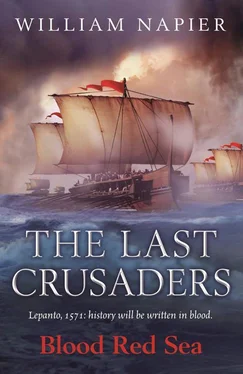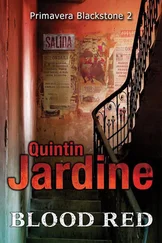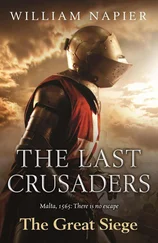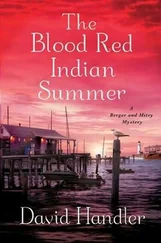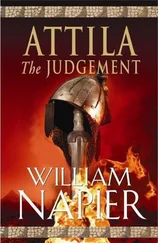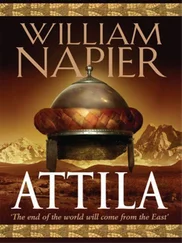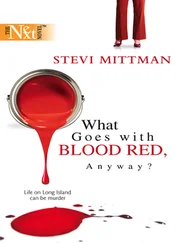William Napier - Blood Red Sea
Здесь есть возможность читать онлайн «William Napier - Blood Red Sea» весь текст электронной книги совершенно бесплатно (целиком полную версию без сокращений). В некоторых случаях можно слушать аудио, скачать через торрент в формате fb2 и присутствует краткое содержание. Жанр: Исторические приключения, на английском языке. Описание произведения, (предисловие) а так же отзывы посетителей доступны на портале библиотеки ЛибКат.
- Название:Blood Red Sea
- Автор:
- Жанр:
- Год:неизвестен
- ISBN:нет данных
- Рейтинг книги:4 / 5. Голосов: 1
-
Избранное:Добавить в избранное
- Отзывы:
-
Ваша оценка:
- 80
- 1
- 2
- 3
- 4
- 5
Blood Red Sea: краткое содержание, описание и аннотация
Предлагаем к чтению аннотацию, описание, краткое содержание или предисловие (зависит от того, что написал сам автор книги «Blood Red Sea»). Если вы не нашли необходимую информацию о книге — напишите в комментариях, мы постараемся отыскать её.
Blood Red Sea — читать онлайн бесплатно полную книгу (весь текст) целиком
Ниже представлен текст книги, разбитый по страницам. Система сохранения места последней прочитанной страницы, позволяет с удобством читать онлайн бесплатно книгу «Blood Red Sea», без необходимости каждый раз заново искать на чём Вы остановились. Поставьте закладку, и сможете в любой момент перейти на страницу, на которой закончили чтение.
Интервал:
Закладка:
‘Please, Your Majesty, it’ll soon wash off in the English rain.’
‘I don’t doubt it,’ she said. ‘Hodge, it is such as you that shall make our England the glory of the world. And as for you, Nicholas Ingoldsby — Sir Nicholas Ingoldsby, I should say — your late father, Sir John, was by all accounts a good gentleman, though not one for the Court.’
‘No, Majesty. He liked the country.’
‘Hm. You too?’
‘I too. The Court is not my world. The old hills of Shropshire. .’
‘After all your adventures?’
‘Yes, Majesty.’
She pursed her pale lips. ‘Nevertheless, your father entertained Catholic knights in secret at his Shropshire home. During arrest he resisted and died of natural causes. Yes?’
Nicholas swallowed. ‘Yes, Your Majesty.’
‘His estates passed into the hands of the local magistrates, and their value to our exchequer. We see nothing remiss in this. But now further enquiries suggest that the Justice of the Peace, one Gervase Crake, has provoked widespread dissatisfaction. There are reports of cruel treatment, and worse, peculation against the Crown. Action will be taken against him in due course. But I should say that if meanwhile Sir Nicholas Ingoldsby himself, though still barely more than a boy, were to go back to his native Shropshire and demand the return of his ancestral lands — by force if necessary — the Crown might at least wink at such proceedings.
‘In the future, perhaps this Ingoldsby might make a very serviceable Justice himself, and servant of the Queen. But for that he would have to abandon his Popish religion and swear loyalty to the Church of England.’
Nicholas said nothing. What could he say?
Her Majesty understood very well what agonies of conscience could make a man say nothing. She herself had spent much of her life in careful silence, not choosing, and would no doubt spend years more that way. Silence was a friend who would never betray.
‘You will write of all your travels,’ she said. ‘I have never travelled outside England, not even to Wales, nor desire to. You have wandered far and wide. You will write up your adventures, what you have seen. You will tell all. We want to know the customs of Shrove Tuesday in Cadiz, the weather in Naples, the winds in the Messina Strait. The fortifications of Malta and Cyprus. .’
Nicholas bowed. He had never contemplated setting down his experiences in writing, but now it was a royal command, he had no choice in the matter.
‘You will have half a dozen men-at-arms to recover your property.’
‘With gracious respect, Majesty, that is not needed. I have a man-at-arms worth a dozen.’ He nodded at Hodge.
‘He is an Achilles, this Hodge?’ she said with irony.
‘He is,’ said Nicholas without irony.
‘I cracked a few unbelieving skulls, Your Majesty, it’s true,’ volunteered Hodge, against all court etiquette. The chamberlain winced. ‘They took some crackin’ and all.’
The Queen smiled now. ‘Hodge, Hero of Malta, and better yet — Englishman. I decree an annual pension of five pounds for life.’
Hodge gasped.
For many years after in Shropshire, the tale was told. Of how Gervase Crake, the hated but powerful Justice, had been overseeing the whipping of a vagabond girl at the cart’s end in a market square one bleak February day. And two grim-faced strangers rode into the square, just as had happened, so folk memory said, some six years before. They were on horseback, and they carried swords, and they looked as if they knew how to use them. They were as sunburned as Spaniards yet they spoke English.
They demanded the weeping girl be set free. Crake opposed them with a sneer. Had he not six ruffians for his guard? More than ruffians. Three of them carried tattoos on their brawny forearms, showing they were mercenaries who had fought with the dreaded free companies, in the German wars of religion.
A fight broke out, and in a matter of minutes four of the ruffians lay dead. The two others fled, sore wounded, and were never seen again in the county. The two strangers bore a few knocks and bruises too, but fewer than Gervase Crake. He was then stripped and whipped and thrown in the dog pound until some later use could be found for him. As a chimney sweep, perhaps, or tavern turnspit.
One of the strangers was the long-lost son of old Sir John Ingoldsby, come to claim his inheritance. The old hall that Crake himself had been living in! So of course it was all shipshape and handsomely cared for. Then the son of old Ingoldsby found his sisters in another gentleman’s house, two of them now in service as maids. A third had died in his absence. Their reunion was such a thing to see, they said, it would make a stone weep.
And afterwards, a serving-man said he had glimpsed the long-lost son of old Sir John Ingoldsby go into the barn there at the hall, near sunset it was, and find the things of his boyhood still hanging on the walls. A child’s leather saddle, the one he’d learned to ride on. A hoop and a stick. A toy sword made for him by the gardener, long since lain in the churchyard. And the son had fallen to his knees and wept, till his man Hodge came and helped him into the house.
But others said it was wrong of the serving-man to spy and worse of him to tattle. For surely that young Ingoldsby had travelled wide and seen many things, more than most of them in the village would ever see in their lives. And doubtless his heart was full of all the beauties and the sorrows of the world.
EPILOGUE
The Battle of Lepanto was hailed by Cervantes himself as the greatest event in the history of the world. Certainly it seemed to win a general peace, though with occasional skirmishes, and establish the bounds between the Christian world and the Muslim for generations.
Yet there followed some strange occurrences.
Only six months later, in a small back room in a house in Algiers, Kara Hodja was gunned down by two mysterious, hulking masked men carrying four pistols apiece. The assassins were never caught.
The captured banner of the knights in Hagia Sophia vanished from under the very noses of the Turks, and reappeared in the Chapel of St John in Valletta, Malta, only a few weeks later.
Most astounding of all, the stuffed skin of the gallant Marc’antonio Bragadino, still cruelly displayed in the Topkapi Palace, also disappeared. Such a feat seemed almost impossible, and the Ottoman court wrote long letters demanding to know who was responsible.
No Christian prince or prelate could advise on it.
But in 1572, the last mortal remains of Marc’antonio Bragadino were buried with full honours in the magnificent Basilica of San Giovanni e Paolo, in Venice, where they remain to this day.
Pope Pius died in 1572.
Don John enjoyed his hour of fame and had many more beautiful mistresses, including Diana di Falangola, Zenobia Saratosia and Ana de Toledo. There were plans for him to marry Mary, Queen of Scots, or even an invasion to make him King of Ireland. They came to nothing.
His brother Philip sent him to Flanders to fight the unwinnable war there against the Protestant rebels. He died of typhoid in 1578, only seven years after his great victory of Lepanto, aged just thirty-one. In his last year he wrote, ‘I spend my time building castles in the air but in the end, my castles and I alike blow away in the wind.’
His brother Philip lived on until 1598, racked with gout and suffocated by asthma.
Sebastiano Veniero recovered from his severe wounds, and in 1577 was given the ultimate accolade of being made Doge of Venice. It is said that in his very last years he mellowed a little. He now rests in the Basilica of San Giovanni e Paolo, along with Bragadino.
Andrea Doria lived on until 1606. He was suspected by some of cowardice at Lepanto for not having engaged more closely. But those who had been there knew the truth.
Читать дальшеИнтервал:
Закладка:
Похожие книги на «Blood Red Sea»
Представляем Вашему вниманию похожие книги на «Blood Red Sea» списком для выбора. Мы отобрали схожую по названию и смыслу литературу в надежде предоставить читателям больше вариантов отыскать новые, интересные, ещё непрочитанные произведения.
Обсуждение, отзывы о книге «Blood Red Sea» и просто собственные мнения читателей. Оставьте ваши комментарии, напишите, что Вы думаете о произведении, его смысле или главных героях. Укажите что конкретно понравилось, а что нет, и почему Вы так считаете.
